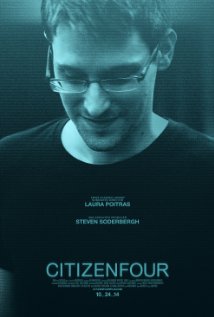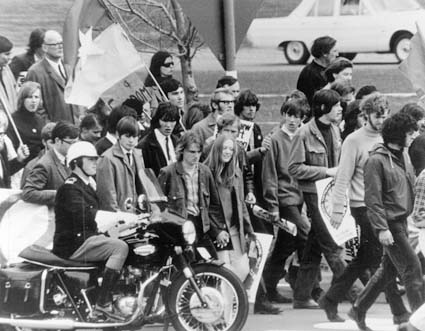‘Surveillance is control: Citizenfour reviewed’, Honest History, 15 February 2015
Australia has form in surveillance. The Keepsakes exhibition at the National Library of Australia has the caption ‘A wartime police state’ on exhibits depicting the Hughes Government’s actions against alleged subversives like the Industrial Workers of the World. Leslie Jauncey’s brother, the mildly anti-war Eric, living in the United States, was harassed by the predecessor of the FBI, with the assistance of its Australian counterpart. John Burton and Manning Clark were persons of interest to ASIO, as were Phillip Adams, Frank Moorhouse, Katharine Susannah Prichard and many others.
Today, every country in the world (including Australia) is potentially linked to every other country in the global surveillance village. Alison Broinowski reviews Citizenfour for Honest History. She has previously reviewed Frank Moorhouse’s Australia Under Surveillance and written about the Hilton bombing of 1978 and related events. Details of Citizenfour. Other reviews of the movie have appeared in the Guardian, the Sydney Morning Herald , Inside Story (Sylvia Lawson) and Variety. Edward Snowden, Glenn Greenwald and Laura Poitras discuss the movie. HH
 In 1517 Martin Luther nailed his principles to the church door, saying ‘Here I stand. I can do no other’. Nearly 500 years later, Edward Snowden did the same on film, putting it slightly differently: ‘Here I am. Fuck you. I’m not going to hide.’ Both of these men outraged their employers, the Catholic Church in Luther’s case and the United States government in Snowden’s.
In 1517 Martin Luther nailed his principles to the church door, saying ‘Here I stand. I can do no other’. Nearly 500 years later, Edward Snowden did the same on film, putting it slightly differently: ‘Here I am. Fuck you. I’m not going to hide.’ Both of these men outraged their employers, the Catholic Church in Luther’s case and the United States government in Snowden’s.
Citizenfour, Laura Poitras’ Pulitzer Prize-winning documentary, which opened in October in New York and in February in Australia, stirs similar passions. Poitras records how Edward Snowden, self-exiled in Hong Kong, reveals to her and fellow journalist, Glenn Greenwald, the world-wide telecommunications interceptions conducted by the National Security Agency (NSA). She follows Snowden to Moscow where, reunited with his partner Lindsay, he remains, avoiding arrest.
Not much outrage about this film is likely in Australia, however. We have none of the constitutional protections of freedom and privacy whose flouting by the authorities so disturbs Snowden. Many Australians who should see Citizenfour are unlikely to do so or, if they see the film, they will not comment on it. As usual. Some of them will think they already know all they need to about the nerdy systems analyst from an army family who came to NSA by way of the CIA and Booz Allen Hamilton, a management consultancy whose only client is the US government. Some people consider Snowden a traitor (as Attorney-General George Brandis does) while others call him a hero (as the Sam Adams foundation does). The Sam Adams Award, named after a Vietnam War whistleblower and given to both Snowden and Julian Assange, is for intelligence officials who ‘demonstrated a commitment to truth and integrity, no matter the consequences’.
Snowden clearly understands and anticipates the consequences of his massive leaks. On film, he and Greenwald plan a media strategy to explain to the world that the US automatically intercepts and stores its telecommunications and uses XKeyScore and other programs to analyse them. A British counterpart, codenamed TEMPORA, also collects everyone’s metadata but without the legal restraints that supposedly protect US citizens. TEMPORA is the envy of the NSA, whose people ask ‘Why can’t we collect all the signals all the time?’ Greenwald’s finest hour, in this movie, is on CNN when he calmly asserts that the US government in fact can and does collect not just all metadata but all content, too. National security, he then tells his Brazilian audience in fluent Portuguese, is only the excuse: NSA’s objective is to enable the US, in alliance with the big telcos, to compete with and dominate other countries, their economies and companies.
Later in Berlin, Poitras films a meeting of concerned lawyers discussing the three charges laid against Snowden under the antique US Espionage Act. The process, says an American, is 95 per cent politics and 5 percent law. Poitras interviews the owner of Lavabit, a small internet service producer, which was forced to close down rather than give the FBI data that would reveal the identities of all its clients. Poitras follows former long-serving NSA officer, William Binney, whose home was raided at gunpoint by the FBI in 2005 and who calls the authorities’ data-mining activities ‘a major threat to democracy’.
The FBI has 1.2 million Americans on a terrorism watch list and Poitras is told that others so fear to be ‘on the list’ that they self-police their internet searches to avoid certain topics. ‘What is surveillance except control?’ someone asks.
Poitras focuses most on the charismatic Greenwald and the anguished, often silent Snowden, whose codename is ‘Citizenfour’. She films his occasional outbursts, including the disgust he shares with Greenwald about Obama’s broken pre-election promise to eliminate illegal surveillance and protect whistleblowers. She records his determination to go public, face the consequences and inspire others to do the same. We read Poitras’ lines of internet chat with Greenwald and Snowden but we never see her: she is an occasional, indistinct, disembodied voice. She films in a cramped hotel room where Snowden and Greenwald, assuming the room is bugged, pass each other key words on pieces of paper which they then tear up.
 ASIO surveillance photograph of Moratorium march, Canberra, 18 September 1970 (National Archives of Australia A9626, 7649323)
ASIO surveillance photograph of Moratorium march, Canberra, 18 September 1970 (National Archives of Australia A9626, 7649323)
Poitras doesn’t catch the dramatic moment when Snowden is spirited away by WikiLeaks’ Sarah Harrison, nor his re-exile in Moscow airport. This is raw, low-budget documentary with lots of gaps compared with those smoother versions of events that we have come to expect. It reminds us how glamorised, sanitised or fictionalised those versions are. Yet the very rawness of the film helps ram home the surveillance/control argument.
The film’s international scope does not exempt authorities in Australia from responsibility for decades of complicity in surveillance, which is not about to end. Anyone can Google ‘Five Eyes’ for more on that.
©Alison Broinowski 2015


Leave a Reply
You must be logged in to post a comment.